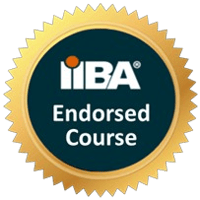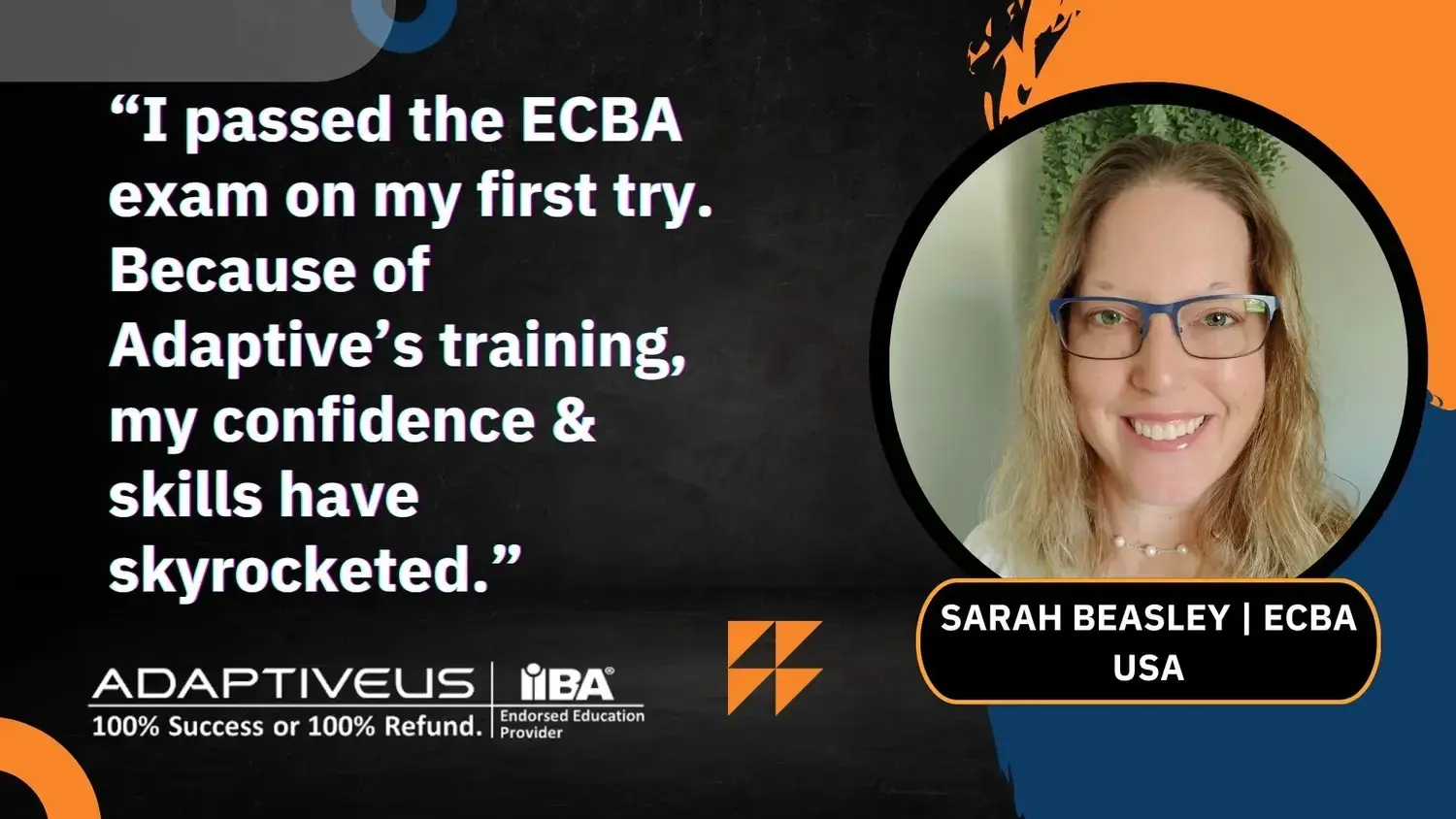Unquestionably World's #1
ECBA Training Program
Success Guarantee. 2 Free Retakes. 700+ ECBAs.
IIBA Endorsed ECBA Certification Prep Training
Guaranteed ECBA Certification.
Adaptive's 4 Awesome Guarantees

Success Guarantee

Moneyback Guarantee

Run Guarantee
(On Weekend Classes)

Endorsed Courses
- Intro
- Deliverables
- Syllabus
- Trainers
- Reviews
- Pricing
- Schedule
- Resources
- FAQ

Official ECBA Training with Success Guarantee
Lay the foundation stone of your BA career with IIBA ECBA certification
As a BA, your professional growth is directly linked to how you stand out among other BAs. With Adaptive’s IIBA ECBA training, you are sure to get that booster that will turn you into an internationally certified business analyst. Adaptive’s ECBA course, comes with 21 IIBA PD hours, 800+ practice questions, 6 mock tests, study guide, 10+ hours video learning, and 300+ flash cards. Adaptive’s ECBA course is endorsed by IIBA for ECBA preparation. During your ECBA certification preparation, Adaptive faculty support you for long 6 months in your ECBA exam preparation clarifying all your ECBA questions. /p>
Whether you’ve just landed your first BA job or are planning to get into BA profession, our ECBA training is a stepping stone to enhancing and proving your business analysis expertise. It serves as a validation of your knowledge and sets you apart from other candidates applying for the same position in the competitive job market. Think of this program as your identification card that instantly showcases your capabilities and augments your earning potential. IIBA Entry Certificate in Business Analysis (IIBA ECBA) certification is designed for professionals to prove their knowledge in business analysis. /p>
What awaits you during Adaptive’s ECBA Training Course with Success Guarantee
This program makes you exam-ready to ace IIBA Level 1 - ECBA exam. The course focuses on acquiring skills that comply with ECBA requirements. Our ECBA course provides targeted support as you prepare for the exam to get your IIBA Level 1 ECBA certification. This support is underpinned by our training instructors, who are IIBA-certified experts with 25+ years of experience in business analysis, mentors, and IIBA-ECBA exam committee members. They bring their real-life knowledge and expertise to the table while ensuring you pick up the relevant skills for your career. Adaptive’s program for IIBA ECBA training is packed with comprehensive learning materials. Besides, you will receive useful advice from our facilitators on how to be ready for any exam challenge, take several full-length mock tests, and get access to audiobooks, flashcards, and instructors’ presentations. The program is based on four 4-hour live sessions along with live fortnightly office hours. If you need to brush up on something before your IIBA exam, you can go through class recordings at your convenience.
Once you’re done with our ECBA training, you’ll be able to:
- Understand the ECBA exam preparation process
- Fluently speak the BABOK terminology language with a deeper understanding of business analysis
- Realize the nitty-gritty of the Knowledge Areas and tasks in BABoK
- Familiarize with BABOK techniques and their usage
- Answer IIBA-ECBA knowledge-based questions with sound conceptual clarity
- Get the best tips to pass the exam without second-guessing or confusion
- Enrich your BA resume with Adaptive’s course completion certificate
ECBA Training Target Audience
Whether you’re determined to transition into business analysis from another position or starting out in this field, our program is made to give you the knowledge and skills you need to succeed. Join our community of goal-oriented BA professionals and make your first step towards becoming a proficient business analyst.
ECBA Requirements / Eligibility
ECBA being the entry level program, it indeed has very limited requirements / eligibility.
To obtain the IIBA Entry Certificate in Business Analysis (ECBA) certification, you need to register for an IIBA account, agree to the Code of Ethical Conduct and Professional Standards, and agree to the terms and conditions, with no specific work experience or professional development hours required.
Here's a more detailed breakdown of the ECBA certification requirements:
1. Registration and Agreement:
You must register for an IIBA account.
You need to agree to the Code of Ethical Conduct and Professional Standards.
You must agree to the Terms and Conditions.
2. No Specific Experience or Professional Development Hours Required:
There are no formal work experience requirements to sit for the ECBA exam.
The previous requirement of 21 hours of Professional Development (PD) has been eliminated.
3. Exam Preparation:
The ECBA exam is based on the Business Analysis Standard and Business Analysis Body of Knowledge (BABOK).
You can find ECBA certification training courses on the IIBA website.
IIBA recommends choosing from their list of endorsed education and training providers.
4. Exam Details:
The ECBA exam is an online remote proctored exam managed by IIBA's exam delivery partner PSI®.
You must have a valid, government-issued photo ID (driver's license, passport, etc.).
Ensure your name on the ID matches exactly what is on your IIBA and PSI accounts.
You will need to show your room to the proctor before starting the exam.
You won't be allowed to have two monitors, and the video camera must be on during the test.
5. Further Information:
For more details, you can refer to the IIBA ECBA Handbook.
You can also find information on the IIBA website about the ECBA certification, including the exam blueprint and competencies.
ECBA Training Program Eligibility
- You are comfortable with learning materials in English
- You’re well-versed in business and IT concepts
- You have a computer or laptop with a functional microphone, a speaker and high speed internet (>2Mbps)
- You can take online classes in a noise-free environment for uninterrupted learning
IIBA is unable to provide certifications in the following countries: Cuba, Iran, North Korea, Syria or the region of Crimea. There is no restriction on taking the training though.
Advance Your Career Through Our ECBA Training Program
Are you looking to advance your career in business analysis?
Our ECBA Training Program offers a comprehensive solution. This program equips you with essential skills in project management and business analysis, preparing you for ECBA certification. Through hands-on simulations and expert-led sessions, you'll gain mastery over the ECBA certification. Learn how our ECBA training program can boost your career prospects, explore the curriculum structure, and discover success stories from past participants. Enroll now to take the first step towards becoming an internationally certified business analyst.
Key Takeaways
- ECBA certification validates core business analysis skills and opens doors to entry-level business analyst positions
- The program covers essential concepts like business analysis planning, stakeholder engagement, and requirements elicitation and requirements analysis
- Flexible learning options and payment plans make the training accessible to diverse professionals
- Past students reported improved job prospects and ability to contribute effectively in various industries
- Networking opportunities and ongoing support enhance career growth potential for certified professionals
Understand the Value of the ECBA Training Program
Our ECBA Training Program offers immense value for professionals seeking career advancement. We'll explore the ECBA certification's importance, key skills developed, and career opportunities it unlocks. Our program covers essential concepts like waterfall and agile software development model, preparing you for diverse roles in technology across USA, Canada, Australia, UAE and beyond.
Define the ECBA Certification and Its Importance
The Entry Certificate in Business Analysis (ECBA) is a foundational certification that validates a professional's understanding of core business analysis concepts. Our program emphasizes key skills like traceability and stakeholder engagement, essential for success in today's internet-driven business landscape, from any part of the world such as India, Brazil to global markets.
We designed our ECBA Training Program to prepare you for real-world challenges, including crafting effective use cases and navigating complex project requirements. This certification serves as a springboard for career growth, opening doors to entry-level business analyst positions and providing a solid foundation for advanced certifications in the field.
Identify Key Skills Developed Through ECBA Training
Our ECBA Training Program cultivates essential skills that enhance your professional growth. We focus on building your confidence in business analysis techniques, fostering a learning mindset, and expanding your knowledge of industry-standard practices. Through expert-led live classes sharing real-world scenarios, we help you develop a sharp analytical mind.
The training equips you with practical skills in requirements gathering, stakeholder analysis, and process modeling. We emphasize the importance of effective communication and problem-solving abilities, which are crucial for success in any business analyst role. By the end of our program, you'll have gained a comprehensive understanding of business analysis fundamentals and be well-prepared for the ECBA certification exam.
Analyze Career Advancement Opportunities With ECBA
Our ECBA Training Program opens up numerous career advancement opportunities in software development, banking, insurance and health-care companies. We've seen graduates leverage their certification to secure roles in diverse industries, from fintech startups to established corporations. The skills you'll gain, including proficiency in creating comprehensive requirements documentation, position you as a valuable asset in any organization's business analysis team.
With ECBA certification, you'll be well-equipped to contribute to software projects, bridging the gap between business needs and technical solutions. Our program prepares you for roles such as Junior Business Analyst, Requirements engineer, Requirements analyst or Associate Product Owner. As you apply your newfound skills in real-world scenarios, you'll find yourself on a path of continuous growth and professional development in the dynamic field of business analysis.
Course Structure and Curriculum of ECBA Training
Our ECBA Training Program offers a comprehensive curriculum designed to equip you with essential business analysis skills. We'll explore the program's modules, prerequisites, duration, and learning methods. Our course incorporates global perspectives captured through BABOK. We use English language instruction to prepare you for international opportunities and help you achieve your career dreams.
Overview of ECBA Training Modules
Our ECBA Training Program consists of comprehensive modules that cover essential business analysis concepts. We focus on requirements analysis techniques, collaboration strategies, and scrum methodologies to provide a well-rounded understanding of the field. Our training and development approach ensures you grasp both theoretical knowledge and practical applications.
We structure our modules to build your skills progressively, starting with foundational concepts and advancing to more complex topics. Our curriculum includes:
- Introduction to Business Analysis
- Requirements Elicitation and Management
- Data Modeling and Analysis
- Agile and Scrum Methodologies
- Stakeholder Collaboration Techniques
- Business Process Modeling
Required Prerequisites for Enrolment
We've designed our ECBA Training Program to be accessible to professionals from various backgrounds. While there are no strict prerequisites, we recommend having basic knowledge of business processes and computers. Our expert instructors guide you through user story creation and methodology application, ensuring you're well-prepared for the certification exam.
To maximize your learning experience, we suggest familiarizing yourself with common business analysis terms and concepts before enrolment. This preparation helps you engage more effectively with the course material and contribute to class discussions. Our program caters to both aspiring and experienced professionals looking to enhance their skills in the business analysis profession:
- Basic understanding of business processes
- Familiarity with project management concepts
- Strong analytical and problem-solving skills
- Effective communication abilities
- Willingness to learn and adapt to new methodologies
Duration and Format of the Training Sessions
Our ECBA Training Program offers flexible scheduling to accommodate diverse professional needs. We structure the training into intensive sessions spanning 4-6 weeks, with each session focusing on key aspects of business analysis. Our format includes interactive lectures, hands-on exercises, and real-world case studies to prepare you for employment opportunities and successful interviews.
We provide ongoing feedback throughout the training to ensure your progress and readiness for the credential exam. Our comprehensive fee covers all training materials, practice exams, and a personalized study plan. The program's format is designed to maximize learning efficiency and retention, setting you up for success in your business analysis career:
- Interactive online sessions
- Hands-on workshops
- Group mentoring sessions
- Access to multiple ECBA test simulations
Learning Methods and Tools Used in the Program
We employ diverse learning methods in our ECBA Training Program to cater to different learning styles and maximize knowledge retention. Our master class sessions, led by experienced business analysts, provide in-depth insights into real-world applications of business analysis techniques. We incorporate case studies from various industries, including organizations in the USA, UK, Canada and Japan, to broaden your global perspective on business analysis practices. Our program utilizes cutting-edge tools to enhance your learning experience and prepare you for management roles. We provide information on industry-standard software for requirements management, process modeling, and data analysis. Through hands-on exercises, you'll gain practical experience using these tools, ensuring you're well-equipped to tackle real-world challenges in your future career. Our learning approach includes:
- Interactive online lectures
- Virtual collaboration platforms
- Business analysis software training
- Simulated project environments
- Peer-to-peer learning sessions
Steps to Enroll in the ECBA Training Program
We've streamlined our ECBA Training Program enrolment process to help you advance your career in information technology domain. Our registration process is straightforward, with flexible payment options and financial aid available. We'll guide you through important dates and deadlines, ensuring you're well-prepared to boost your salary potential through our comprehensive training.
Registration Process for the ECBA Training
Our registration process for the ECBA Training Program is designed to be straightforward and user-friendly. We've integrated key concepts from business analysis and agile software development into our enrolment system, ensuring a smooth experience. To begin, visit our website and select the ECBA Training option from our course catalog. Once you've chosen the program, you'll be guided through a series of steps to complete your registration. We offer various payment options, including the ability to purchase an audiobook version of our course materials. After submitting your payment, you'll receive immediate access to our online learning platform, where you can start exploring the foundational concepts of business analysis:
| Step | Action |
| 1 | Visit Schedule Tab |
| 2 | Choose the right session and plan |
| 3 | Choose payment option |
| 4 | Submit payment |
| 5 | Access online learning platform |
Payment Options and Available Financial Aid
We offer flexible payment options for our ECBA Training Program, including instalment plans and free access duration for early registration. We prioritize making our program accessible to all, thus providing it in multiple time zones. This ensuring that time zone barriers don't hinder your ability to advance your business analysis skills. Our team provides personalized financial guidance to help you navigate payment. We've partnered with several organizations to offer instalment payment abilities. Our goal is to empower you to focus on learning without undue financial stress:
| Payment Option | Description |
| Full Payment | One-time payment |
| Instalment Plan | Monthly payments over course duration |
| Employer Sponsorship | Direct billing to your organization |
Important Dates and Deadlines to Remember
We've carefully structured our ECBA Training Program to align with your requirements, be it on weekdays or weekends. Our curriculum includes multiple choice evaluations to assess your progress throughout the course. We recommend marking these important dates on your calendar to ensure you don't miss any deadlines such as:
- Registration Deadline
- Course Start Date
- Mid-term Evaluation
- ECBA Exam Registration Deadline
Our program incorporates global perspectives, including case studies from multiple business environments. We've designed the curriculum to prepare you for international opportunities, with a focus on adaptability and cross-cultural understanding. By adhering to these deadlines, you'll maximize your learning experience and position yourself for success in the ECBA certification exam.
Gain Insights From ECBA Training Success Stories
We showcase real-life experiences from ECBA certified professionals, highlighting their career transformations and success stories. Our case studies demonstrate how our training program has empowered business analysts to excel in requirements analysis and facilitation roles. Many past students have shared their testimonials, emphasizing the skills gained and the supportive community they've joined. These insights provide valuable perspectives on the ECBA exam and career prospects.
Real-Life Experiences From ECBA Certified Professionals
We've witnessed numerous success stories from ECBA certified professionals who have leveraged our training program to advance their careers. Many graduates have reported significant improvements in their ability to create comprehensive mind maps, a skill that has proven invaluable in their roles as business analysts. Our certification program has equipped them with the tools to excel in requirements gathering and stakeholder management.
Our ECBA certified alumni consistently attribute their career growth to the practical skills and knowledge gained through our training. They emphasize how the certification has enhanced their credibility in the workplace, leading to increased responsibilities and leadership opportunities. We've seen graduates apply their newfound expertise in diverse industries, from healthcare to finance, demonstrating the versatility and value of the ECBA certification.
Case Studies Highlighting Career Transformations
We've documented several inspiring case studies that showcase the transformative power of our ECBA Training Program. One standout example is Arpandeep Hanjra, a former support specialist who transitioned into a business analyst role at a major tech firm after completing our course. Her success story highlights how our program's focus on user story mapping and stakeholder analysis techniques directly contributed to her career advancement.
Another noteworthy case is Mathew Welborn, an IT professional who leveraged his ECBA certification to secure a position as Lead Business Analyst. His experience demonstrates how our training in data flow diagrams and process modeling equipped him with the skills to excel in a new industry. These case studies underscore the versatility and value of our ECBA Training Program across diverse career paths.
Testimonials From Recent ECBA Training Graduates
We've received overwhelmingly positive feedback from our recent ECBA Training Program graduates. Many participants have praised the program's comprehensive coverage of business analysis concepts, with particular emphasis on the practical application of techniques like process modeling and requirements elicitation.
Graduates consistently report feeling well-prepared for the ECBA certification exam and more confident in their ability to contribute effectively to their organizations. Our alumni have shared how the skills acquired during the training have directly impacted their work performance.
One graduate mentioned that the program's focus on stakeholder analysis techniques helped them navigate a complex project involving multiple departments, resulting in successful implementation and recognition from senior management. Another participant highlighted how the training in data flow diagrams enhanced their ability to communicate complex systems to non-technical stakeholders, leading to more efficient project outcomes.
Prepare for the ECBA Exam After Training
We provide comprehensive support for ECBA exam preparation after our training program. Our recommended study materials cover key concepts, while our expert tips help you develop effective study strategies. We offer practice exams and resources to build your confidence, ensuring you're well-prepared for the certification test. Our approach combines theoretical knowledge with practical application, setting you up for success.
Recommended Study Materials for Exam Prep
We provide a comprehensive set of study materials to help you prepare for the ECBA exam. Our resources include a detailed study guide that covers all key areas of the BABOK Guide, focusing on fundamental concepts like requirements elicitation, requirements analysis and stakeholder engagement. We also offer interactive online modules that reinforce your understanding of critical business analysis techniques.
Our exam preparation package includes practice questions and mock exams that simulate the actual ECBA test environment. We've designed these materials to help you assess your knowledge gaps and improve your test-taking skills. Our recommended study plan combines these resources effectively:
- BABOK Guide review sessions
- Interactive online modules
- Practice question banks
- Full-length mock exams
- Study group forum discussions
Tips for Effective Exam Preparation
We recommend creating a structured study plan that allocates dedicated time for reviewing each knowledge area of the BABOK Guide. Our experience shows that consistent, daily study sessions of 1-2 hours are more effective than cramming. We encourage you to use our practice exams to identify areas where you need improvement and focus your efforts accordingly.
We've found that actively engaging with the material through techniques like teaching concepts to others or creating mind maps can significantly enhance retention. Our online study groups provide a platform for you to discuss complex topics with peers, reinforcing your understanding. We also suggest taking regular breaks during study sessions to maintain focus and productivity.
Practice Exams and Resources for Confidence
We offer a comprehensive suite of practice exams and resources to boost your confidence for the ECBA exam. Our practice tests mirror the actual exam format, covering all knowledge areas and task domains outlined in the BABOK Guide. We regularly update these exams to reflect the latest trends and changes in the business analysis field. Our confidence-building resources extend beyond practice exams. We provide access to a vast library of case studies, allowing you to apply your knowledge to real-world scenarios. Additionally, we offer personalized feedback on your performance, helping you identify areas for improvement. Our approach to exam preparation includes:
- Timed practice exams
- Detailed answer explanations
- Performance analytics
- Flashcards for key concepts
- Video tutorials on complex topics
Networking and Community Opportunities Through ECBA Training
We offer valuable networking opportunities through our ECBA Training Program. You'll join an exclusive community of business analysts, attend industry events and workshops, and build connections for career growth. Our program provides a platform to expand your professional network, share insights, and stay updated on industry trends, enhancing your career prospects in business analysis.
Join an Exclusive Community of Business Analysts
We invite you to join our exclusive community of business analysts through our ECBA Training Program. Our network connects you with experienced professionals and fellow aspiring analysts, creating a supportive environment for knowledge sharing and career growth. We foster collaboration through online forums, where you can discuss industry trends, share best practices, and seek advice on challenging projects.
We organize regular virtual meetups and webinars featuring industry experts, providing you with insights into the latest business analysis techniques and tools. Our community platform offers a space for you to showcase your skills, contribute to discussions, and build lasting professional relationships. We believe that being part of this network will significantly enhance your career prospects and keep you at the forefront of the business analysis field.
Attend Networking Events and Workshops
We organize regular networking events and workshops as part of our ECBA Training Program. These gatherings provide invaluable opportunities to connect with industry leaders, potential employers, and fellow business analysts. Our events cover a range of topics, from emerging trends in data analytics to best practices in stakeholder management, ensuring you stay at the forefront of the field.
We design our workshops to be interactive and hands-on, allowing you to apply your newly acquired skills in real-world scenarios. These sessions often include case studies, group problem-solving exercises, and peer reviews, enhancing your practical understanding of business analysis concepts. By actively participating in these events, you'll build confidence in your abilities and expand your professional network.
Leverage Connections for Career Growth
We encourage you to leverage the connections you make through our ECBA Training Program for career growth. Our alumni network provides access to job opportunities, mentorship programs, and collaborative projects. We've seen numerous success stories where graduates have secured new positions or promotions through relationships forged during our training.
We teach you effective networking strategies as part of our curriculum, helping you build meaningful professional relationships. Our program includes sessions on crafting compelling elevator pitches, maintaining professional online profiles, and following up with contacts. We've found that these skills, combined with the knowledge gained from our ECBA training, significantly enhance your career prospects in the business analysis field.
Frequently Asked Questions
What is the value of obtaining an ECBA certification through our training program?
Obtaining an ECBA certification through our training program enhances your business analysis skills, increases job prospects, and demonstrates your commitment to professional growth. It provides a solid foundation in BA practices, aligning your expertise with industry standards and boosting your credibility in the field.
How is the ECBA training course structured and what does it cover?
The ECBA training course covers fundamental business analysis concepts, tools, and techniques. It's structured to align with the BABOK Guide, including topics like requirements elicitation, stakeholder analysis, and process modeling. The course prepares participants for the ECBA certification exam through lectures, exercises, and practice tests.
What are the steps to enroll in the ECBA training program?
To enroll in the ECBA training program, visit the IIBA website, create an account, select the ECBA course, pay the fee, and complete the application form. Once approved, you'll gain access to study materials and can schedule your exam when ready.
Can you share success stories from previous ECBA training participants?
Many ECBA training participants have reported significant career advancements after certification. They've secured better job opportunities, improved their business analysis skills, and gained confidence in their roles. Some have even transitioned into leadership positions within their organizations, leveraging their newfound expertise.
How does the training program prepare candidates for the ECBA exam?
The ECBA training program equips candidates with essential business analysis skills, covering key concepts, techniques, and best practices. It focuses on the BABOK Guide, offering practice exams, interactive sessions, and real-world case studies to enhance understanding and exam readiness.
Conclusion
Our ECBA Training Program offers a comprehensive pathway to advance your career in business analysis, equipping you with essential skills and knowledge to excel in the field. Through structured modules, hands-on exercises, and real-world case studies, you'll gain practical experience in requirements gathering, stakeholder management, and process modeling. The program provides valuable networking opportunities, connecting you with industry professionals and opening doors to new career prospects. By earning your ECBA certification, you'll position yourself as a credible and competent business analyst, ready to tackle complex challenges and drive organizational success.
See More...
Get Your Dream BA Job Today!
Get Your Dream BA Job Today!
Session – 1 (3 Hours Live Online Class)
- Participant and faculty Introductions
- Understanding Business Analysis (The BA Standard)
- Mindset for Effective Business Analysis (The BA Standard)
- Performing Business Analysis (The BA Standard)
- Intro to BABoK Knowledge Areas
- BABoK Terminology
- BABoK Themes
Session – 2 (3 Hours Live Online Class)
BA Planning and Monitoring
- KA Intro
- Techniques for BA Planning
- BA Planning and Monitoring Tasks
- Plan BA Approach
- Plan Stakeholder Engagement
- Plan BA Governance
- Plan BA Information Management
- Identify BA Performance Improvements
Elicitation and Collaboration
- KA Intro
- Techniques for Elicitation and Collaboration
- Elicitation and Collaboration Tasks
- Prepare for Elicitation
- Conduct Elicitation
- Confirm Elicitation Results
- Communicate BA Information
- Manage Stakeholder Collaboration
Session – 3 (3 Hours Live Online Class)
Requirements life cycle management
- KA Intro
- Techniques for Req. LCM
- Req. LCM Tasks
- Trace requirements
- Maintain requirements
- Prioritize requirements
- Assess requirements changes
- Approve requirements
Strategy Analysis
- KA Intro
- Techniques for Strategy Analysis
- Strategy Analysis Tasks
- Analyze Current State
- Define Future State
- Assess Risks
- Define Change Strategy
Session – 4 (3 Hours Live Online Class)
Requirements Analysis and Design Definition
- KA Intro
- Techniques for RADD
- RADD Tasks
- Specify and model requirements
- Verify requirements
- Validate Requirements
- Define Requirements architecture
- Define Design Options
- Analyze potential value and recommend a solution
Session – 5 (3 Hours Live Online Class)
Solution Evaluation
- Intro to KA
- Techniques for Solution Evaluation
- Solution Evaluation Tasks
- Analyze potential value and recommend a solution
- Measure solution performance
- Analyze performance measures
- Assess solution limitations
- Assess enterprise limitations
- Recommend actions to increase solution value
- IIBA Exam Information + Tips
- PD Hour Details
12 Exam Prep Tutorials (75 Minutes Live Online Classes)
Office hours / Q&A Sessions / Tutorial
- Answer student queries on question banks
- Preparation tips
Get Your Dream BA Job Today!

Victoria Cupet CBAP, CBDA, AAC, CPOA
PhD in Education, Board of director of IIBA. 25+ years of experience. Speaker, author & trainer.

LN Mishra CBAP, CCBA, ECBA, CBDA, AAC, CPOA, CCA
Mentor to 2000+ IIBA Certified Business Analysts. 25+ years of BA experience.

Lora McCoy CBAP, CBDA, AAC, CPOA, CCA
Former Regional Director, IIBA Central Americas. Former President – IIBA Oklahoma Chapter. 22+ years of BA experience.

Olivia Hampton CBAP, CBDA, AAC, CCA
Skilled change management professional and trainer with 15+ years of experience in various roles and industries.

Tom Tomasovic AAC, ECBA, CBDA, CPOA
Agile BA Practitioner, CPRE Certified. B.S. Chemical Engineering – Massachusetts Institute of Technology. 26+ years of BA experience

Bindu Channaveerappa
CBAP, CCA
Regional Director IIBA EMEA, BA Consultant, Author, Trainer & International Speaker on BA and Cybersecurity. 20+ years of experience.
Get Your Dream BA Job Today!
Video Testimonials


Choosing Adaptive US for my ECBA training was one of my best decisions! Their expert faculty and structured classes gave me the confidence to pass the exam within two months, that too on the first attempt. From an Incident Analyst, I was promoted to an IT BA within 3 months of certification! For anyone considering a switch to Business Analysis, ECBA with Adaptive US is the way to go! |
After my Master’s, I aspired to be a BA but faced 500+ rejections due to a lack of experience and BA skills. Enrolling in Adaptive US’s ECBA training changed everything! It boosted my confidence, improved communication, and gave me the right BA exposure. By the end of the 5-week training, I landed my first BA job! Huge thanks to Adaptive US & LN’s mentorship - they are the best. |
With aspirations of becoming a BA, I researched and realized that getting ECBA certified was the best way ahead. I decided to enroll with Adaptive US owing to their proven competence. Upon getting certified, I got my first BA job within a month. The BA knowledge that I acquired during the training gave me confidence at work. Adaptive has great resources for BAs & I highly recommend them! |
Adaptive ECBA course is amazing, the live classes, material, videos and quizzes are all so thorough that the exam feels no different than Adaptive's simulations. I am so pleased with the course that I am signing up for the CCBA instructor-led classes! |
The training material from Adaptive US is exactly what you need to be prepared for IIBA certification. The online classes helped a lot with understanding BABOK. LN Mishra did a great job in supporting and preparing me for the ECBA exam. Thanks LN :) |
I have just got CCBA certified in my first attempt. 2 months ago, when I was skeptical, Adaptive US answered all my concerns and reinstated my confidence. I would recommend Adaptive to anyone who is looking for support to achieve BA skill and certification. |
Get Your Dream BA Job Today!
(Guaranteed to Run)
- 21 IIBA PD Hours
- Covers 2 retake fees of USD 95 each
- 15 hours of live virtual BABoK classes (Weekend Training)
- 12 live Q&A sessions of 75 minutes each post core BABoK classes (over 6 months of exam prep support)
- Downloadable ECBA Study Guide
- 1000+ Model Questions including 6 full-length simulations
- BABOK Videos + Flashcards and Audiobooks
- Exam prep plan and tips
- 180 days resources (LMS) access period
- Success Guarantee
- Money-back Guarantee
USD 749 USD 449 ($300 OFF)
- All the above Benefits
- 1 Year IIBA Membership - $139
- ECBA Exam Fee - $195
*IIBA Exam Voucher Activation can take up to 7 business days
USD 1099 USD 749 ($350 OFF)
- Everything in the ECBA Master Class and Additionally covers-
- Weekend or Weekday Cohort Options
- Lifetime Resource Access
- 1 Repeat Training (Weekend)
- Additional 12 live Q&A sessions of 75 minutes each post-core BABoK classes
- 12 Months of ECBA Exam Prep Support
- 20 CDUs for any IIBA recertification (does not include IIBA recertification fees)
- 6 Months Extended Success Guarantee
- Email Support
USD 1599 USD 1199 ($400 OFF)
- All the above Benefits
- 1 Year IIBA Membership - $139
- ECBA Exam Fee - $195
(IIBA Exam Voucher Activation can take up to 7 business days)
USD 1949 USD 1499 ($450 OFF)
The prices mentioned in the website are valid for online purchases. Prices vary for invoiced courses.
Get Your Dream BA Job Today!
Get Your Dream BA Job Today!
Adaptive US ECBA Training Resources
| Instructions | eBook - How to Use Thinkific Learning Portal |
| Introduction |
Video on Introduction Video on BA V3 Themes Video on BA knowledge areas Video on BA V3 Glossary eBook - eBook - Study Guide - Preface and Introduction Presentation - Introduction to BABOK |
| BA Key Concepts |
Video on Key terms Video on Requirements classifications Video on BABOK roles eBook - Study Guide - Business analysis Key Concepts Concept Questions - BA Concepts Concept Questions - BABOK Terms Knowledge Based Questions - Intro to BA Knowledge Based Questions - BABOK Terms |
| BA Planning and Monitoring |
Video on Intro to BA planning and monitoring Video on Task - Plan BA approach Video on Task - Plan stakeholder engagement Video on Task - Plan BA governance Video on Task - Plan BA information management Video on Task - Identify BA performance improvements eBook - Study Guide - Business Analysis Planning and Monitoring Concept Questions - BA Planning Knowledge Based Questions - BA Planning Flashcards - BA Planning Audiobook - BA Planning Presentation - BA Planning |
| Elicitation and Collaboration |
Video on Intro to Elicitation and Collaboration Video on Task - Prepare for elicitation Video on Task - Conduct elicitation Video on Task - Confirm elicitation result Video on Task - Communicate BA information Video on Task - Manage stakeholder collaboration eBook - Study Guide - Elicitation and Collaboration Concept Questions - Elicitation - Part 1 Concept Questions - Elicitation - Part 2 Knowledge Based Questions - Elicitation Flashcards - Elicitation Audiobook - Elicitation Presentation - Elicitation and Collaboration |
| Requirements LCM |
Video on Intro to Requirements Lifecycle Management Video on Task - Trace Requirements Video on Task - Maintain Requirements Video on Task - Prioritize Requirements Video on Task - Assess Requirements Changes Video on Task - Approve Requirements eBook - Study Guide - Chapter 5 - Requirements Life Cycle Management Concept Questions - Requirements LCM Knowledge Based Questions - Requirements LCM Flashcards - Requirements LCM Audiobook - Requirements LCM Presentation - Requirements LCM |
| Requirements Analysis and Design Def. |
Video on Intro to Requirements Analysis and Design Definition Video on Task - Specify and Model Requirements Video on Task - Verify Requirements Video on Task - Validate requirements Video on Task - Define Requirements architecture Video on Task - Define Design Options Video on Task - Analyze Potential Value and Recommend Solution eBook - Study Guide - Chapter 6 - Requirements Analysis and Design Definition Concept Questions - Requirements Analysis and Design Definition - Part 1 Concept Questions - Requirements Analysis and Design Definition - Part 2 Knowledge Based Questions - Requirements Analysis and Design Definition Audiobook - Requirements Analysis and Design Definition Presentation - Requirements Analysis and Design Definition |
| Strategy Analysis |
Intro to Strategy analysis Video on Task - Analyze current state Video on Task - Define future state Video on Task - Assess risks Video on Task - Define change strategy eBook - Study Guide - Chapter 6 - Strategy Analysis Concept Questions - Strategy Analysis ECBA - Warm-up Level 1 - Strategy analysis ECBA - Warm-up Level 2 - Strategy analysis Flashcards - Strategy Analysis Audiobook - Strategy Analysis Presentation - Strategy Analysis |
| Solution Evaluation |
Intro to Solution Evaluation Video on Task - Measure solution performance Video on Task - Analyze performance measures Video on Task - Assess solution limitations Video on Task - Assess enterprise limitations Video on Task - Recommend actions to increase solution value eBook - Study Guide - Chapter 8 - Solution Evaluation Concept Questions - Solution Evaluation ECBA - Warm-up Level 1 - Solution evaluation ECBA - Warm-up Level 2 - Solution evaluation Flashcards - Solution Evaluation Audiobook - Solution Evaluation Presentation - Solution Evaluation |
| Underlying Competencies |
Video on Intro to Underlying Competencies Video on Analytical Thinking and Problem Solving Video on Behavioral Characteristics Video on Business Knowledge Video on Communication Skills Video on Interaction Skills Video on Tools and Technology eBook - Study Guide - Chapter 9 - Underlying Competencies Concept Questions - Underlying Competencies - Part 1 Concept Questions - Underlying Competencies - Part 2 Knowledge Based Questions - Underlying Competencies |
| Techniques |
Video on Acceptance and evaluation criteria Video on Backlog Management Video on Balanced scorecards Video on Benchmarking and market analysis Video on Brainstorming Video on Business Cases Video on Business capability analysis Video on Business Model Canvas Video on Business rules analysis Video on Collaborative games Video on Concept modelling Video on Data dictionary Video on Data flow diagrams Video on Data mining Video on Data modelling Video on Decision analysis Video on Decision modelling Video on Document analysis Video on Estimation Video on Financial analysis Video on Focus groups Video on Functional decomposition Video on Glossary Video on Interface analysis Video on Interviews Video on Item tracking Video on Lessons learned Video on Metrics and key performance indicators Video on Mind mapping Video on Non-functional requirements analysis Video on Observation Video on Organizational modelling Video on Prioritization Video on Process analysis Video on Process modelling Video on Prototyping Video on Reviews Video on Risk analysis and management Video on Roles and permissions matrix Video on Root cause analysis Video on Scope models Video on Sequence diagrams Video on Stakeholder list map or personas Video on State modelling Video on Survey or questionnaire Video on SWOT analysis Video on Use cases and scenarios Video on User stories Video on Vendor assessment Video on Workshops eBook - Study Guide - Chapter 10 - Techniques Concept Questions - Techniques - Part 1 Concept Questions - Techniques - Part 2 Knowledge Based Questions - Techniques Presentation - BA Techniques |
| Workshop Materials |
ECBA Session Plan Requirements Traceability Relationships BA Techniques - When to Use Which One |
| Reference Materials |
BABOK V3 KAs and Tasks Overview Mindmap 6 KAs and 30 Tasks of BABOK V3 Mindmap BABOK V3 Techniques Mind-map BABOK Word Cloud Mindmap Business Analysis Workbook BABOK V3 Tasks Summary BABOK V3 Glossary-KA wise |
| Exam Prep Help |
ECBA Exam Preparation Plan with FAQs The Ultimate IIBA Exams Info Guide The Ultimate IIBA Exam Tips Guide ECBA v3 Audiobook BABOK Analysis Document |
| Simulation Tests |
ECBA Simulation Test 1 ECBA Simulation Test 2 ECBA Simulation Test 3 ECBA Simulation Test 4 ECBA Simulation Test 5 ECBA Simulation Test 6 |
Get Your Dream BA Job Today!
What is ECBA certification?
ECBA (Entry Certificate in Business Analysis) is IIBA certification for individuals starting a career in business analysis.
How do I apply for ECBA certification?
Apply online through IIBA (International Institute of Business Analysis) and meet eligibility criteria.
What is the ECBA exam format?
50 multiple-choice questions to be completed in 75 minutes.
What is the passing score for ECBA?
IIBA doesn't provide any passing score for its tests. However, we expect the passing score to be typically around 75%.
How long is the ECBA certification valid?
ECBA certification doesn't expire and valid for life.
Can I renew my ECBA certification?
ECBA certification doesn't need to be renewed as it is valid for ever. You should progress to higher-level certifications such as CCBA and CBAP.
Are there any prerequisites for ECBA?
No, there are no specific work experience or education prerequisites for ECBA.
What is the BABOK guide?
BABOK is a guide published by IIBA that defines the framework for business analysis practices.
How can I access the BABOK guide?
You can purchase the BABOK guide from the IIBA website. You also get it free when you become a member of IIBA.
How can I join IIBA as a member?
Visit the IIBA website and sign up for membership.
Get Your Dream BA Job Today!

Official ECBA Training with Success Guarantee
Lay the foundation stone of your BA career with IIBA ECBA certification
As a BA, your professional growth is directly linked to how you stand out among other BAs. With Adaptive’s IIBA ECBA training, you are sure to get that booster that will turn you into an internationally certified business analyst. Adaptive’s ECBA course, comes with 21 IIBA PD hours, 800+ practice questions, 6 mock tests, study guide, 10+ hours video learning, and 300+ flash cards. Adaptive’s ECBA course is endorsed by IIBA for ECBA preparation. During your ECBA certification preparation, Adaptive faculty support you for long 6 months in your ECBA exam preparation clarifying all your ECBA questions. Whether you’ve just landed your first BA job or are planning to get into BA profession, our ECBA training is a stepping stone to enhancing and proving your business analysis expertise. It serves as a validation of your knowledge and sets you apart from other candidates applying for the same position in the competitive job market. Think of this program as your identification card that instantly showcases your capabilities and augments your earning potential. IIBA Entry Certificate in Business Analysis (IIBA ECBA) certification is designed for professionals to prove their knowledge in business analysis.
What awaits you during Adaptive’s ECBA Training Course with Success Guarantee
This program makes you exam-ready to ace IIBA Level 1 - ECBA exam. The course focuses on acquiring skills that comply with ECBA requirements. Our ECBA course provides targeted support as you prepare for the exam to get your IIBA Level 1 ECBA certification. This support is underpinned by our training instructors, who are IIBA-certified experts with 25+ years of experience in business analysis, mentors, and IIBA-ECBA exam committee members. They bring their real-life knowledge and expertise to the table while ensuring you pick up the relevant skills for your career. Adaptive’s program for IIBA ECBA training is packed with comprehensive learning materials. Besides, you will receive useful advice from our facilitators on how to be ready for any exam challenge, take several full-length mock tests, and get access to audiobooks, flashcards, and instructors’ presentations. The program is based on four 4-hour live sessions along with live fortnightly office hours. If you need to brush up on something before your IIBA exam, you can go through class recordings at your convenience.
Once you’re done with our ECBA training, you’ll be able to:
- Understand the ECBA exam preparation process
- Fluently speak the BABOK terminology language with a deeper understanding of business analysis
- Realize the nitty-gritty of the Knowledge Areas and tasks in BABoK
- Familiarize with BABOK techniques and their usage
- Answer IIBA-ECBA knowledge-based questions with sound conceptual clarity
- Get the best tips to pass the exam without second-guessing or confusion
- Enrich your BA resume with Adaptive’s course completion certificate
ECBA Training Target Audience
Whether you’re determined to transition into business analysis from another position or starting out in this field, our program is made to give you the knowledge and skills you need to succeed. Join our community of goal-oriented BA professionals and make your first step towards becoming a proficient business analyst.
ECBA Training Program Eligibility
- You are comfortable with learning materials in English
- You’re well-versed in business and IT concepts
- You have a computer or laptop with a functional microphone, a speaker and high speed internet (>2Mbps)
- You can take online classes in a noise-free environment for uninterrupted learning
IIBA is unable to provide certifications in the following countries: Cuba, Iran, North Korea, Syria or the region of Crimea. There is no restriction on taking the training though.
Pricing
ECBA Master Class
(Guaranteed to Run)
- 21 IIBA PD Hours
- Covers 2 retake fees of USD 95 each
- 15 hours of live virtual BABoK classes (Weekend Training)
- 12 live Q&A sessions of 75 minutes each post core BABoK classes (over 6 months of exam prep support)
- Downloadable ECBA Study Guide
- 1000+ Model Questions + 6 Exam simulations
- BABOK Videos + Flashcards and Audiobooks
- Exam prep plan and tips
- 180 days resources (LMS) access period
- Success Guarantee
- Money-back Guarantee
USD 749 USD 449 ($300 OFF)
ECBA Master Class with ECBA Exam Voucher
- All the aboveBenefits
- 1 Year IIBA Membership - $139
- ECBA Exam Fee - $195
*IIBA Exam Voucher Activation can take up to 7 business days
USD 1099 USD 749 ($350 OFF)
ECBA Ultimate
- Everything in the ECBA Master Class and Additionally covers-
- Weekend or Weekday Cohort Options
- Lifetime Resource Access
- 1 Repeat Training (Weekend)
- Additional 12 live Q&A sessions of 75 minutes each post-core BABoK classes
- 12 Months of ECBA Exam Prep Support
- 20 CDUs for any IIBA recertification (does not include IIBA recertification fees)
- 6 Months Extended Success Guarantee
- Email Support
USD 1599 USD 1199 ($400 OFF)
ECBA Ultimate With ECBA Exam Voucher
- All the above Benefits
- 1 Year IIBA Membership - $139
- ECBA Exam Fee - $195
(IIBA Exam Voucher Activation can take up to 7 business days)










